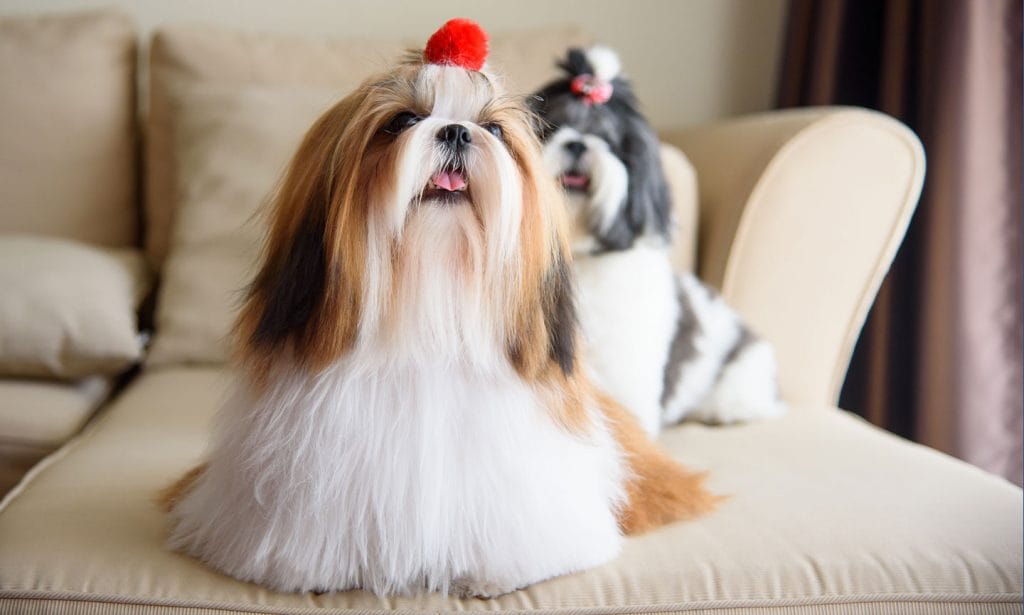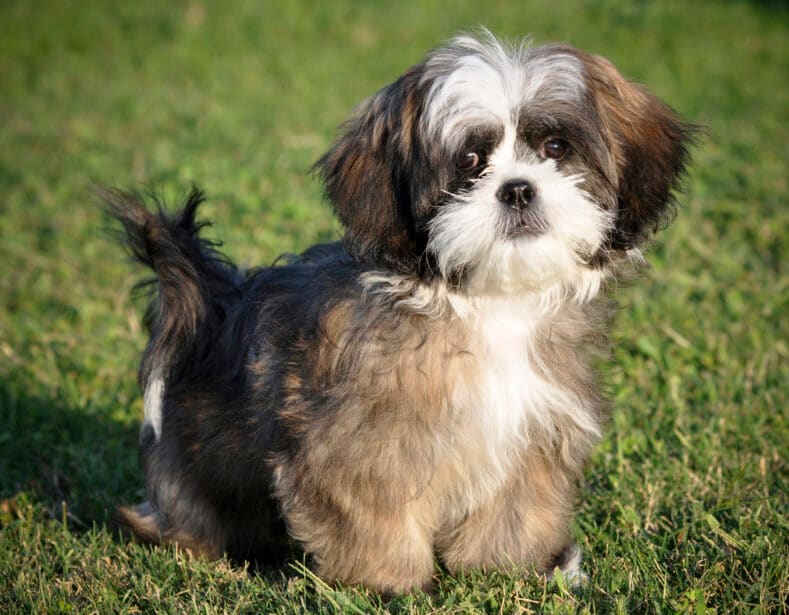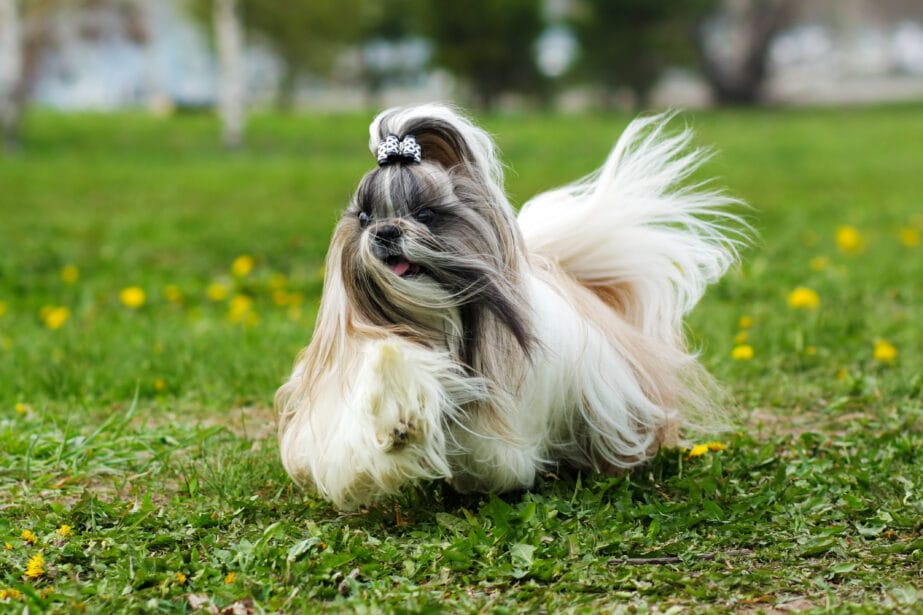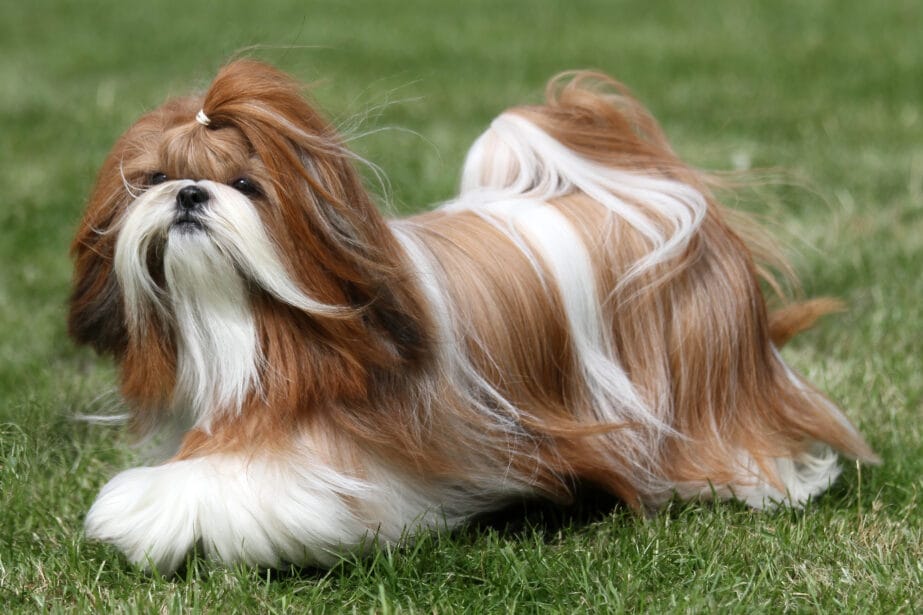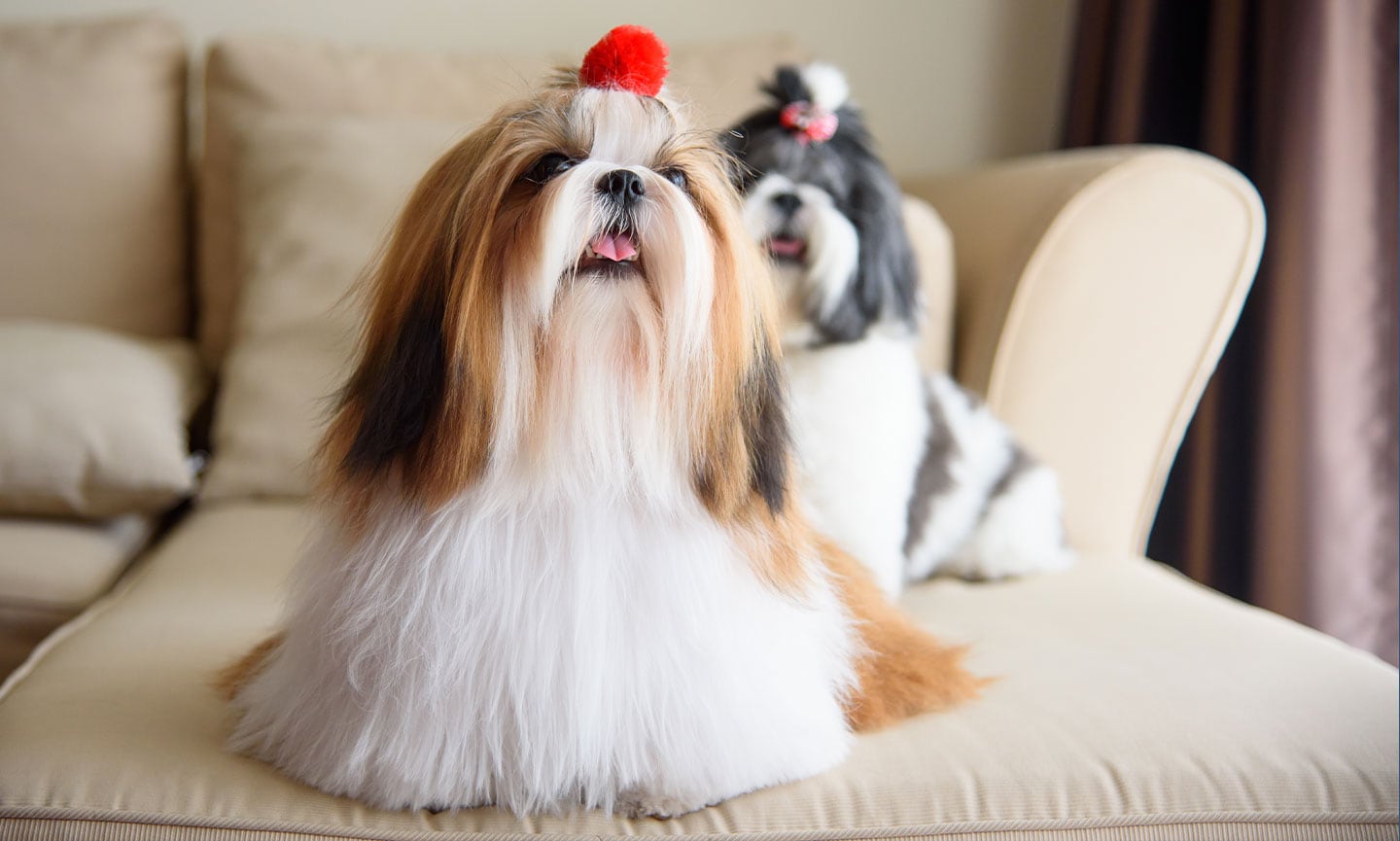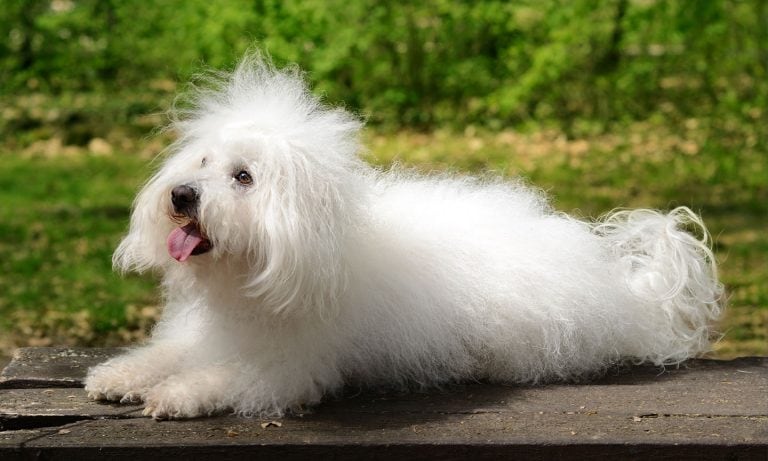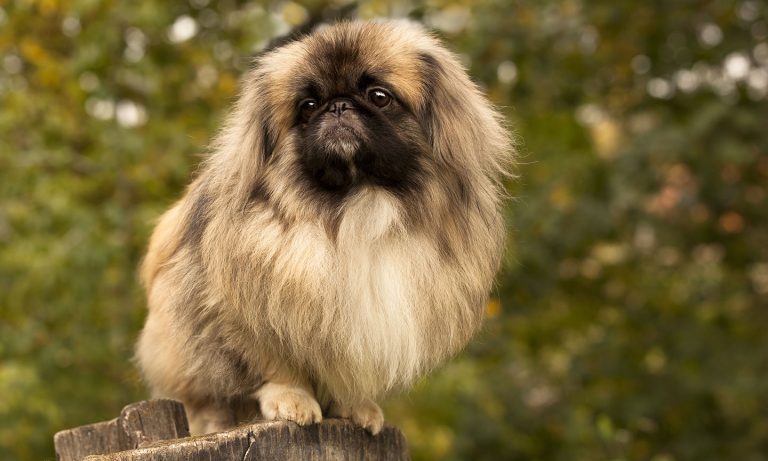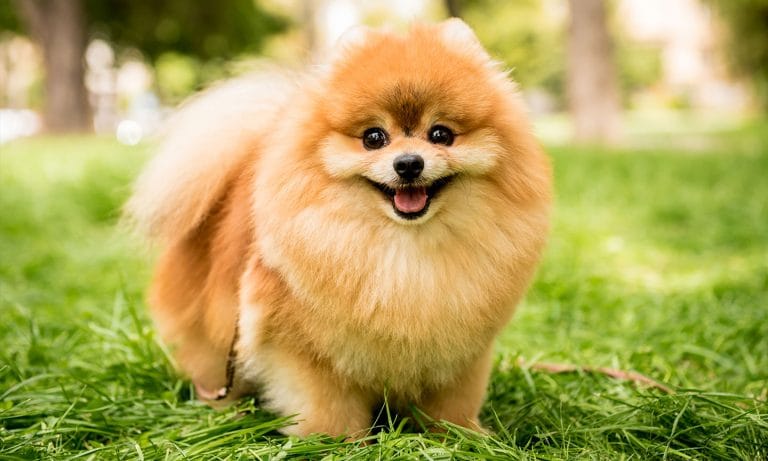Even though their name means “little lion” in Mandarin, the playful Shih Tzu is a lover, not a fighter. Your pup will enjoy curling up on your lap at home as much as they will thrive basking in the adoration of passersby at the park. Once lapdogs to emperors, the Shih Tzu certainly looks the part of a royal, glamorous breed with their long, flowing silky coat. But make no mistake, while their coat is high maintenance, this intelligent and independent breed is full of surprises and capable of much more than lounging on pillows all day. In fact, they’ve been known to be a frontrunner in agility competitions. Never one to put on airs, your even-tempered Shih Tzu will get along with most everyone, other pets included. But you’ll always be their No. 1.
Breed Snapshot
Temperament:
Good-NaturedLovingCraves AttentionCoat Color:
BlackBrindleGoldSilverRedWhiteLiverBlue
Best For
With a charming personality and minimal exercise needs, Shih Tzus make perfect indoor companions for those seeking a loving and low-maintenance canine friend.
Shih Tzu Temperament
Small in size but big on personality, the Shih Tzu is adored by everyone they meet. An agile and adaptable pet, your pint-sized pooch will love cuddling with you on the couch in front of the TV, but they’re equally happy trotting by your side in the park.
A fun-loving breed, Shih Tzus enjoy playing with older children, who understand how to play gently with a small dog, and other four-legged pets as long as proper introductions have been made (they are descended from royalty after all). They aren’t known for biting, but like any dog, they may bite if pushed too far in rough play. Be sure to teach all children how to gently interact with dogs, and to supervise your Shih Tzu puppy around young children who may mistake this adorable pup for their favorite stuffy.
With their ability to assess situations much faster than other small breeds, the Shih Tzu is so much more than a pretty face. They make excellent watchdogs; they are always on alert for someone approaching your home and will let you know they’re coming. Even though they may exhibit a stubborn streak and require extra patience when training, they are worth the effort. Their loyalty and calm manner in all types of situations serve them in good stead as emotional support animals when their small size is not an issue.
How to Care for a Shih Tzu
Regular grooming is essential for showing off your Shih Tzu dog’s luxurious long hair and keeping it out of their eyes. You may find yourself needing extra doses of love and care during training. But good news! It all balances out, as these low-shedding pups require less daily exercise than other dogs and can be just as happy playing hide-and-seek in your living room as chasing after a ball in the park.
Shih Tzu Health
The Shih Tzu has a life expectancy of 10 to 18 years and can be susceptible to a range of health issues. It’s important to be aware of potential health problems, so you can help your pup live their healthiest life possible.
- Liver Shunts: Shih Tzus are more likely to develop a liver shunt called portosystemic shunt (PSS) that prevents toxins from being removed from their bloodstream. This can lead to symptoms such as seizures or stunted growth. Ask your vet to test your pooch’s blood for this issue and conduct an ultrasound liver scan. Sometimes diet and medication may be enough to treat this disorder, but in other cases, your Shih Tzu may require surgery.
- Bone and Joint Problems: Shih Tzus suffer from a few bone and joint problems, including patellar luxation and hip dysplasia. Patellar luxation is the condition where the kneecap slips out of place. Mild cases may be treated with joint supplements and pain medication, though surgery may alleviate more severe symptoms. Hip dysplasia causes the hip joints to form improperly and can lead to arthritis. Symptoms can include bunny hopping, limping or pain. A vet can diagnose it with X-rays and identify the right course of treatment which may include weight management, medication or, in severe cases, surgery.
- Eye Problems: Eye conditions that could affect your pet include dry eye, glaucoma or cataracts. Dry eye is caused when the eyes don’t produce enough tears. Signs of dry eye include a thick discharge or pawing at the eye, and it can typically be treated with ointment. Glaucoma and cataracts both can lead to blindness if left untreated. It’s important to screen your Shih Tzu for these conditions as early as possible so they can be diagnosed and treated with medications and surgery as recommended by your veterinarian.
- Kidney Disease: If your Shih Tzu has inherited glomerulonephropathy, their kidneys may fail at an early age. Clinical signs include lack of appetite, vomiting, increased drinking, increased urinating and weight loss. Your vet may recommend annual or semiannual bloodwork and urinalysis to check the health of your pup’s kidneys and identify any issues early. However, if your pet is showing any of the symptoms, please make an appointment right away.
- Brachycephalic Syndrome: Smoosh-faced cuties like Shih Tzus have anatomical changes to their nose and throat that make them prone to overheating and having trouble breathing. If your pet is experiencing any trouble breathing, see your veterinarian immediately.
Shih Tzu History
Though their earliest ancestors can be traced as far back as 1000 B.C. in China, Shih Tzus as we know them in modern-day times originated in Tibet. These luxury lapdogs were given as gifts to Chinese royalty and were a favored house pet during the Ming dynasty (1368 to 1644 A.D.).
They were later bred with Pekingese or Pugs in a world-famous breeding program that fell apart when its founder, Empress Tzu Hsi, died in 1908. As a result, their numbers dwindled to only seven males and seven females, which were then used to rebuild the breed. Every Shih Tzu dog alive today is descended from one of those last 14 pups.
After they were exported to England and other European countries, American soldiers stationed overseas brought the pups back to the US in the 1940s and 1950s. Since they arrived in the West, Shih Tzus have become a highly coveted breed, receiving American Kennel Club recognition as a member of the toy group in 1969. Famous celebrity pet parents include Bill Gates, Beyonce, Mariah Carey and Queen Elizabeth II.
Are you looking to add a Shih Tzu as a pet? You can find a list of reputable breeders on the American Kennel Club’s website. What’s the average Shih Tzu price? Expect to spend anywhere from $1,200 to $3,000 for a pup who’s been screened for health and temperament issues and may even come with pedigree papers. You can also reach out to Shih Tzu rescue organizations, keep an eye out at your local animal shelter, or search Chewy’s database of adoptable dogs in your area.
Have you seen teacup Shih Tzus online? Neither the AKC nor reputable breeders recognize these really small dogs. These pups have been bred for their small size and are often unhealthy. Sadly, these pups are touted as being “rare,” so they cost more. If you see a breeder who has these types of dog, find a different breeder.
FAQs
Are Shih Tzus hypoallergenic?
No, Shih Tzus are not hypoallergenic. Although they don’t shed as much as other breeds and are one of the few dogs to have hair rather than fur, they are not recognized as a hypoallergenic breed by the AKC.
What are the most popular Shih Tzu names?
Some of the most popular Shih Tzu names are Oreo, Reese, Levi, Lila, Domino, Socks, Bambalina, Cosette, Cooper, Paco and Bardot. Get more dog names here.
What are the most common Shih Tzu mixes?
The most common Shih Tzu mixes are:
- Shih Tzu-Poodle mix (Shih-Poo or Shoodle)
- Shih Tzu-Maltese mix (Mal-Shi, Malti zu or Malt-Tzu)
- Shih Tzu-Yorkie mix (Shorkie )
- Shih Tzu-Chihuahua mix(Shichi)
- Shih Tzu-Pomeranian mix (Shiranian)
- Shih Tzu-Bichon mix (Shichon)
- Shih Tzu-Dachshund mix (Schweenie)
Note: These are not purebred dogs but mixed breeds.
Do Shih Tzus bark a lot?
Yes, Shih Tzus bark a lot, especially if they sense someone at the door. For this reason, they make excellent watchdogs. However, they can be taught not to bark excessively with the use of positive reinforcement and consistent training.
Where are Shih Tzus from?
The Shih Tzus we know today are from Tibet and were bred with Pekingese or Pugs by imperial Chinese breeders.
Can Shih Tzus swim?
Yes, Shih Tzus can swim, but they are not good at it and don’t have the stamina to go long distances. It’s a good idea to get a well-fitting life jacket for your pup if you’re going to be around water (ponds, lakes, pools).
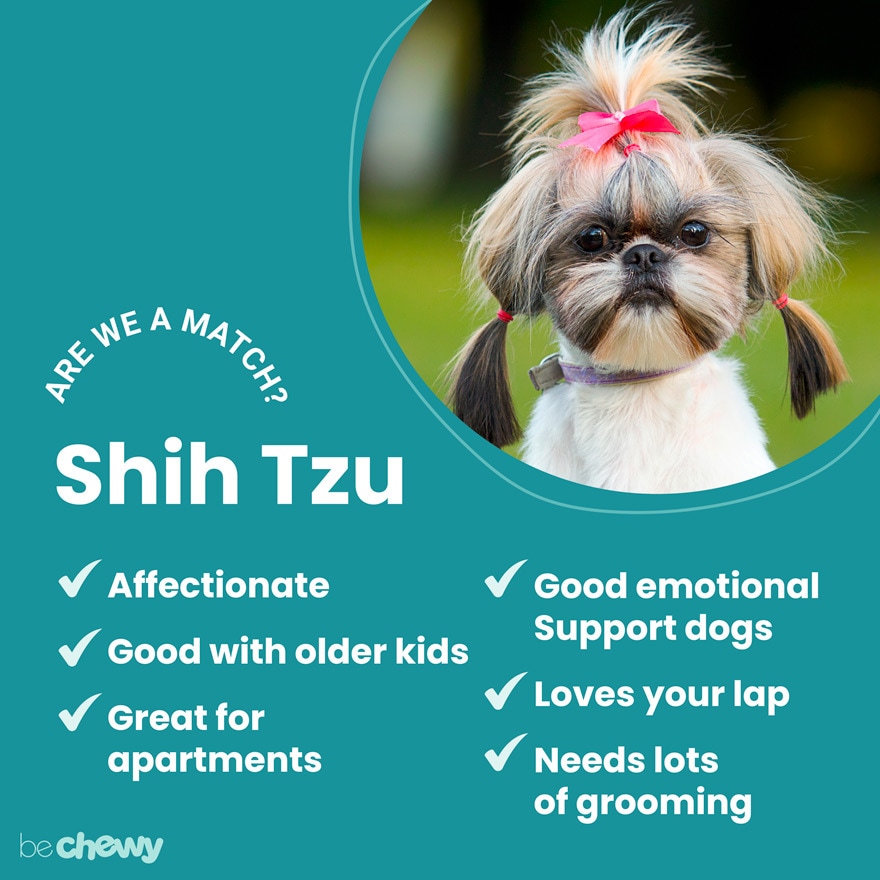
Top Takeaways
Shih Tzus make loyal, affectionate companions for families with older children and love apartment living. Exceptionally playful and friendly, these toy dogs require extra care with grooming and a little more patience with training, but their forever love in return makes it all worthwhile.
Expert input provided by veterinarian Kristi Flynn, DVM, assistant professor of primary care at the College of Veterinary Medicine at the University of Minnesota, and canine behavior consultant Colleen Demling-Riley, CPDT-KA, CBCC-KA, CDBC, owner of Pawtopia Dog Training and dog behaviorist at Dogtopia.
Breed characteristic ratings provided by veterinarian Dr. Sarah J. Wooten, DVM, CVJ, a veterinarian at Sheep Draw Veterinary Hospital in Greeley, Colorado; dog trainer and behavior consultant Irith Bloom, CPDT-KSA, CBCC-KA, CDBC, owner of The Sophisticated Dog, LLC, in Los Angeles; and certified animal behavior consultant Amy Shojai, CABC, in Sherman, Texas.
The health content was medically reviewed by Chewy vets.

Search for Adoptable Shih Tzus Near You
Female Names
- Bella
- Luna
- Daisy
- Coco
- Lola
- Lucy
- Chloe
- Zoey
- Sophie
- Molly
Male Names
- Milo
- Teddy
- Gizmo
- Max
- Oreo
- Charlie
- Cooper
- Toby
- Chewy
- Leo
Share:
